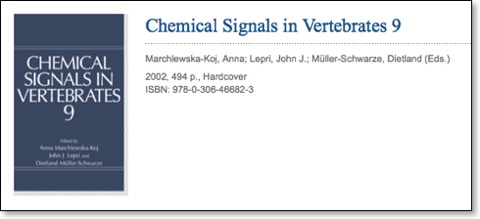Social status and mate choice

Malone, N., Payne, C.E., Beynon, R.J. & Hurst, J.L. (2001) Social status, odour communication and mate choice in wild house mice. . In: Chemical Signals in Vertebrates (Ed. A. Marchlewska-Koj, D. Muller-Schwarze & J. Lepri) pp217-224. Plenum Press, New York.
The competitive social status of a male as a dominant territory owner or a subordinate is a very important factor in female mate choice in semi-natural mouse populations. Female discrimination appears to be based on qualitative differences in a number of androgen-dependent volatiles in male urine, resulting in an almost exclusive mating preference for dominant territory owners. It is not yet known whether females also use status-related differences in scent deposition patterns to discriminate between males. However, variations in the laboratory models used to examine the behavioural and chemical basis of male social strategies call into question how well such studies reflect normal dominant-subordinate relationships between males in natural populations. Further studies are thus required to confirm the chemical basis of status signalling under natural or semi-natural conditions, while long-term studies of lifetime reproductive success would also allow estimation of the fitness value of different male social strategies. Androgen-dependent semiochemicals and scent marking may allow females to select mates that are healthy and resistant to diseases but, as yet, little is known about the chemical mechanisms used to detect infection status. Social status appears to be more important than MHC odour-types in determining female mate choice, while evidence for the importance of MHC odour-type in determining mate choice among wild mice is still equivocal. Further studies are needed under conditions reflecting the normal genetic and environmental variation found in wild mouse populations and individual variation in competitive ability and attractiveness of territorial males.